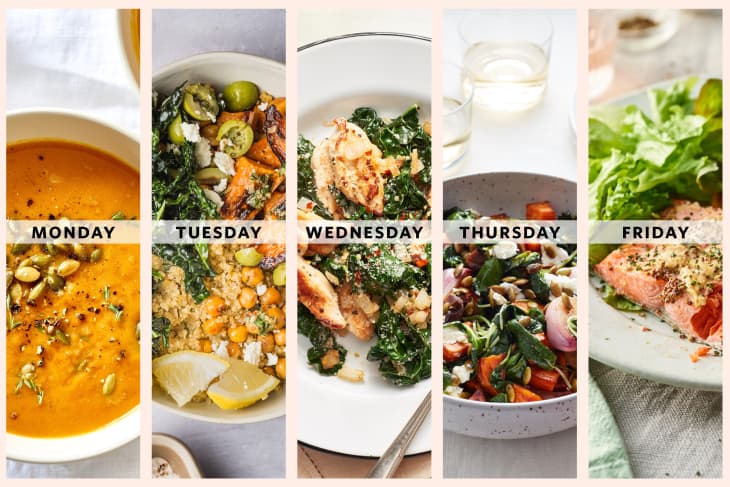The term “Mediterranean Diet” refers to the traditional eating habits in countries around the Mediterranean Sea. It’s not a one-size-fits-all diet, as there are at least 16 countries with diverse eating styles. Variations exist due to differences in culture, ethnicity, religion, economy, geography, and agriculture. Despite these differences, there are some common factors shared among the Mediterranean diets.
How Does The Mediterranean Diet Work?
The Mediterranean diet isn’t a strict plan but a natural eating style developed over centuries. There’s no official way to follow it, making it popular for its well-rounded, non-restrictive approach. It’s noteworthy that two of the five “blue zones,” where people live longer with lower disease rates, are in Mediterranean cities
Benefits Of Mediterranean Diet
- Cardiovascular Health: Reduces the risk of cardiovascular disease.
- Weight Management: Supports a healthy body weight.
- Blood Health: Maintains healthy blood sugar, blood pressure, and cholesterol levels.
- Metabolic Health: Lowers the risk of metabolic syndrome.
- Gut Health: Supports a balanced gut microbiota in the digestive system.
- Cancer Prevention: Reduces the risk of certain types of cancer.
- Brain Function: Slows the decline of brain function with aging.
- Longevity: Contributes to a longer, healthier life.
Tips Of Mediterranean Diet
- Eat Regularly: Have a meal or snack every four to five hours.
- Variety is Key: Mix and match meals and snacks, repeat favorites as desired.
- Plan Ahead: Plan your menu the night before for a game plan.
- Stay Hydrated: Drink water consistently, keep a water bottle handy.
- Wine Moderation: Enjoy up to one glass of wine daily with a meal.
- Mindful TV Snacking: Stick to light popcorn or veggies while watching TV.
- Veggie Freedom: Unlimited non-starchy veggies (carrots, tomatoes, peppers, etc.) anytime.
- Daily Indulgence: Allow one optional “daily cheat,” like a small handful of fries or two bites of something delicious.
Mediterranean Diet Plan

The GH Institute Nutrition Lab’s registered dietitians have crafted an easy-to-follow 7-day Mediterranean meal plan. Emphasizing real, whole foods and minimizing processed ones, it avoids excessive sodium, saturated fat, and added sugar. The plan features simple recipes without calorie-counting or strict portions. You get to enjoy plenty of veggies, fruits, whole grains, and beans, along with lean proteins like seafood, chicken, and eggs. Sweets and alcohol are not off-limits.
7-Day Mediterranean Diet Plan
| Day | Meal |
|---|---|
| 1 | Breakfast: Greek yogurt with berries and honey Lunch: Tuna on greens with olive oil vinaigrette Snack: Small bowl of olives Dinner: Chicken over warm grain salad |
| 2 | Breakfast: Whole-grain toast with soft-boiled egg Lunch: Lentil salad with vinaigrette Snack: Hummus with veggies Dinner: Salmon with quinoa and garlicky greens |
| 3 | Breakfast: Whipped ricotta with walnuts and fruit Lunch: Tabouli salad with pita and hummus Snack: Caprese skewers Dinner: Roasted chicken, gnocchi, and large salad |
| 4 | Breakfast: Fruit with slices of brie Lunch: Lentil soup with whole-grain roll Snack: Tasting plate with olives, cheese, veggies Dinner: Whitefish with spiralized zucchini, sweet potato |
| 5 | Breakfast: Omelet with tomatoes, herbs, and olives Lunch: Salad with white beans, veggies, olives, chicken Snack: Peach and Greek yogurt Dinner: Grilled shrimp skewers with Brussels sprouts |
| 6 | Breakfast: Scrambled eggs with veggies, chives, feta Lunch: Quinoa bowl with chicken, feta, and veggies Snack: Hummus with veggies Dinner: Grilled seafood, roasted fennel and broccoli, arugula salad, quinoa |
| 7 | Breakfast: Veggie frittata Lunch: Smoked salmon plate with crackers and veggies Snack: Mashed avocado with lemon and salt, with cucumber Dinner: Pasta with red sauce and mussels |
Foods To Eat And Avoid In A Mediterranean Diet
Foods To Eat
- Plant Foods
- Minimally processed and seasonally fresh.
- Fruits
- Aim for three servings daily.
- Best when poached or fresh, can be enjoyed as dessert.
- Vegetables
- Aim for three to four servings a day.
- Include a salad with each meal.
- Add an extra serving to lunch and dinner.
- Whole Grains
- Include whole-grain pasta, barley, farro, couscous, and dense, chewy, country-style whole-grain bread without added sugar or butter.
- Nuts
- Include at least 3 servings per week.
- Legumes
- Aim for at least 3 servings per week.
- Include lentils, chickpeas, beans, and peas.
- Extra Virgin Olive Oil
- Main source of fat.
- Cheese and Low-Fat Yogurt
- Consume daily in low to moderate amounts.
- Plain Greek yogurt is recommended.
- Fish
- Two to three servings per week.
- Canned and fresh fish are acceptable.
- Prefer grilled over fried.
- Lean Poultry
- Eat a few times a week in low to moderate amounts.
- Opt for 3- to 4-ounce portions.
- Wine
- With meals in low to moderate amounts.
- No more than two 5-ounce glasses per day for men, and one glass per day for women.
Foods To Avoid
- Processed Red Meats
- Hot dogs
- Bacon
- Lunch meats
- Sausage
- Heavily Processed Foods
- Frozen meals high in sodium
- Sodas
- Sugary beverages
- Sugary desserts
- Candy
- Processed cheeses
- Refined Grains
- White bread
- White pasta
- Products with white flour
- Alcohol (Other than Red Wine)
- Butter
- Refined, Processed, or Hydrogenated Oils
- Soybean oil
- Safflower oil
- Corn oil
- Vegetable oil
- Canola oil
- Hydrogenated and partially-hydrogenated oils
Mediterranean Diet For Weight Loss
What To Consider For Weight Loss?
Your Eating Habits
Maintain a healthy eating routine with regular meals and nutritious snacks. Allow 15-20 minutes before considering a second serving to let your body process hunger signals. Pay attention to your body’s cues for fullness. Embrace a diverse range of whole foods while minimizing processed food intake.
Include Exercise In Your Plan
Make exercise a regular part of your lifestyle for overall well-being, not just during weight loss efforts. Explore new forms of movement, progress gradually, and challenge yourself to increase intensity. Rather than relying on motivation, create a realistic long-term plan and rely on discipline to stay committed even when motivation wavers.
Drink Plenty Of Water
Regardless of your weight loss plan, staying hydrated is essential for feeling and functioning at your best. Dehydration can lead to fatigue and increased hunger, as thirst is sometimes mistaken for hunger. Regular water intake is crucial for increased energy, supporting the immune system, aiding digestion, protecting joints, maintaining healthy skin, and facilitating exercise recovery.
Diet Recipes For Weight Loss
| Meal | Menu 1 | Menu 2 | Menu 3 |
|---|---|---|---|
| Breakfast | Busy Morning Egg Muffins + Whole Wheat Toast | Blueberry Peanut Butter Overnight Oats | Avocado Toast with Eggs + Fruit |
| Lunch | Easy Mediterranean Grilled Chicken Salad | Open-Faced Tuna Melt + Fruit | Leftover Sheet Pan Salmon over Green Salad |
| Dinner | Sheet Pan Panko-Crusted Dijon Salmon | Veggie Lasagna with a Side Salad | Dijon Chicken + Parmesan and Herb Roasted Zucchini + Brown Rice |
| Snacks | Chocolate Fig Bites | Sliced Apple + Nut Butter | Homemade Roasted Red Pepper Hummus + Veggies |
Mediterranean Diet For Beginners
Tips Of Mediterranean Diet
- Opt for Healthy Fat Sources:
- Limit red or processed meats.
- Choose monounsaturated fatty acids from avocado, nuts, or olive oil.
- Aim for 20 to 35 percent of daily caloric intake from fat.
- Keep saturated fats below 10 percent of total caloric intake.
- Don’t Skimp on Calcium:
- Moderate cheese and yogurt consumption.
- Explore nondairy sources like fortified almond milk, sardines, kale, and tofu with calcium sulfate.
- Carve Out Time to Cook:
- Cook with fresh, delicious ingredients.
- Embrace a learning curve in developing cooking skills.
- Edit Favorite Recipes:
- Modify favorite recipes to fit the Mediterranean diet.
- Opt for pizzas with veggies instead of high meat content.
- Use fresh fruits and vegetables to add volume to meals with fewer calories.
- Don’t Go Overboard on Alcohol:
- Sociable red wine consumption is a hallmark.
- Limit to one glass for women and two for men.
- If a family history of breast cancer, consult with a doctor for personalized advice.
For detailed information on Beginners, you may fill the form click here.


